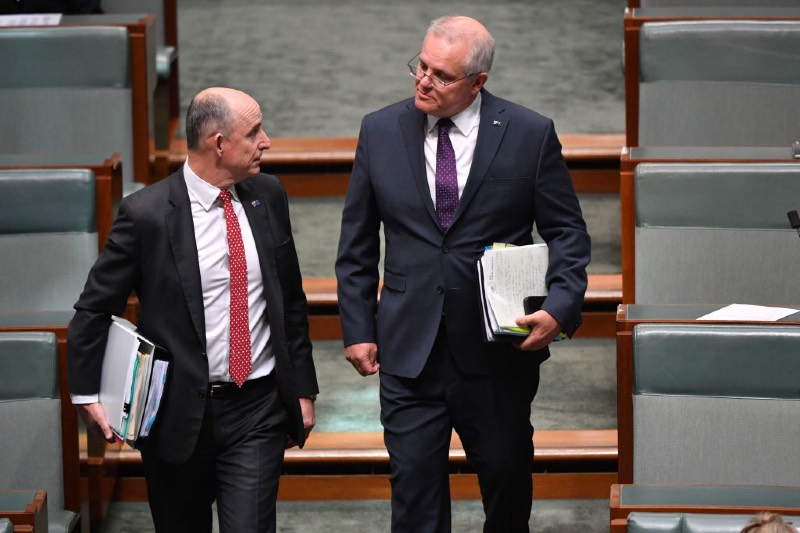A Bible passage has been on my mind since the Prime Minister’s address at the biennial Australian Christian Churches conference, where Christ approaches fisherman and calls them to become his disciples, evangelists, no longer to seek out fish but now people; I will make you fishers of men.

There was an echo of this story in the Prime Minister’s controversial address, that Scott Morrison feels called to use his earthly skills for heavenly purposes, but at the heart of this appeal was also something like evangelism, a call to those Pentecostal leaders present. Morrison asked for their help.
Little of this moment made the initial media coverage once the address leaked, with the Prime Minister’s mention of the devil making many of the headlines. Australia is a secular society with an sharply increasing faithless demographic. Public expressions of belief, particularly belief in the supernatural, have become taboo, triggering an already familiar media cycle.
The headlines — from The Guardian, to The Age, and The Australian — reported on Morrison’s belief that he was called to do God’s work and that ‘the evil one’ was influencing corrosive discourse on social media. Some of the op-eds that followed this coverage considered such expressions of belief to be unusual and worthy of examination, or in the case of former Prime Minister Kevin Rudd’s piece, even problematic and disturbing. Fairfax columnists reacted to perceived anti-religious bigotry online and in the media, and attributed a torrent of intolerance to nebulous forces like ‘keyboard warriors’. Progressive journalists felt that testing the literalism of the Prime Minister’s beliefs was relevant to understanding his politics, where conservative voices saw it all as an attack and felt mocked.
The media can get caught up on religious belief, despite three-fifths of Australians identifying with some religion or spirituality. Even those with no religion can express some belief in things like astrology or feng shui, and reporting on the Prime Minister’s belief as newsworthy ignores this (and may only drive up Morrison’s religious vote). On the other hand, centrist appeals to tolerance fail to acknowledge the disproportionate presence that Pentecostalism wields in politics.
At this point, the media cycle is mostly internal, and while the media is talking to itself, Scott Morrison is talking to a rapidly growing base with significant resources. The devil isn’t in the headline here, the devil is in the detail, in the appeal itself.
'We need a Prime Minister whose faith is focused on solving crisis, not on just consolidating conservativism.'
The Prime Minister’s actual address was rather jumbled but the messaging was important. First, Morrison name-checked other believers in government, demonstrating Pentecostal political presence. Morrison then articulated a shared cause by attempting to marry disparate conservative ideas like the necessity of the church, the limits of government, and the concept of the individual. Morrison closed by again asking for the group’s help, warning against the threats of identity politics and social media.
The Prime Minister gave a roll-call, shared a vision, named enemies, and called for helpers. He wasn’t just talking to his base, he was evangelising, organising them. He was fishing for votes, but he was fishing for men also, and the more the media gets caught up on religious belief, then the less informed the public will be about what Scott Morrison is asking religious communities to help with.
Earlier in the address, the Prime Minister stated that religious community is what Australia needs. He argued that government can’t replace religious communities, but Australia is faced with systemic crises that are subsidised by policy and entrenched in law; wage stagnation, welfare rates below the poverty line, distorted property prices, a social housing shortage, growing carbon emissions and a coal-related culpability in a heating climate. Religious organisations remain the arm of welfare and reform in this country, but more Pentecostal churches alone won’t address these issues. We need the parliament.
We need a Prime Minister whose faith is focused on solving crisis, not on just consolidating conservativism.
In the Bible story, one of the fishermen goes on to become the Apostle Peter, upon whom Christ said he would build his church. Our Prime Minister flew a tax-payer funded aircraft to an event, that his office neither announced or reported on, so that he could build his own church, a broad church organised around vague conservative ideology. He spoke to the national leaders of the fastest growing Christian group in the country, one component of which has pulled in yearly tax-free revenues of around $80 million, and warned them against identity politics.
Scott Morrison is organising a powerful religious base but he’s organising it around himself and his politics, and not around any of the problems the public actually faces.
The sincere passion of early Pentecostalism was marked by progressive attitudes towards issues like gender roles, racial segregation, and military conflict. Morrison’s Pentecostalism is likewise sincere, but it is passionately devoted to a conservative status quo and so deserving of both tolerance and scrutiny. Headlines about the devil are a distraction, and the media will need to get beyond belief if it is to get the story right.
 Anthony N. Castle is an Adelaide-based writer. He has written for The Guardian, The Lifted Brow, Meanjin, and other national publications. He tweets @AnthonyNCastle
Anthony N. Castle is an Adelaide-based writer. He has written for The Guardian, The Lifted Brow, Meanjin, and other national publications. He tweets @AnthonyNCastle
Main image: Prime Minister Scott Morrison arrives for Question Time alongside Minister for Government Services Stuart Robert (Sam Mooy/Getty Images)